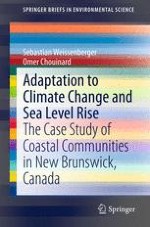The book provides a concise and interdisciplinary outlook on the impacts of climate change on coastal areas and how coastal communities adapt to them. The first chapter analyses how sea level rise, changing ocean conditions, or increased climate variability and the socio-environmental context of the coastal zone leads to vulnerable communities. The second chapter addresses adaptation strategies and tools, and gives some examples of their application around the world. The third chapter describes participative action research projects undertaken in New Brunswick and how this community based approach has enabled communities to increase their climate resilience.
